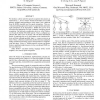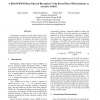106
click to vote
ICASSP
2009
IEEE
15 years 9 months ago
2009
IEEE
We present a data-driven framework for expanding the lexicon to improve Mandarin broadcast news and conversation speech recognition. The lexicon expansion includes the generation ...
104
click to vote
ICASSP
2009
IEEE
15 years 9 months ago
2009
IEEE
We study key issues related to multilingual acoustic modeling for automatic speech recognition (ASR) through a series of large-scale ASR experiments. Our study explores shared str...
117
click to vote
ICASSP
2009
IEEE
15 years 9 months ago
2009
IEEE
We introduce a direct model for speech recognition that assumes an unstructured, i.e., flat text output. The flat model allows us to model arbitrary attributes and dependences o...
116
click to vote
CISIS
2009
IEEE
15 years 9 months ago
2009
IEEE
—This paper presents an approach of location model deriving from language models existing in speech recognition research. The purpose is to applicate existing model in speech rec...
110
click to vote
CHI
2002
ACM
16 years 3 months ago
2002
ACM
This paper presents a novel approach and interface for encouraging children to tell and act out original stories. "Dolltalk" is a toy that simulates speech recognition b...
112
click to vote
CHI
2006
ACM
16 years 3 months ago
2006
ACM
It is tedious to handwrite long passages of text by hand. To make this process more efficient, we propose predictive handwriting that provides input predictions when the user writ...
115
click to vote
CHI
2006
ACM
16 years 3 months ago
2006
ACM
Despite its widespread use, voicemail presents numerous usability challenges: People must listen to messages in their entirety, they cannot search by keywords, and audio files do ...
111
click to vote
ICPR
2006
IEEE
16 years 4 months ago
2006
IEEE
In this paper we propose a novel order-recursive training algorithm for kernel-based discriminants which is computationally efficient. We integrate this method in a hybrid HMM-bas...


